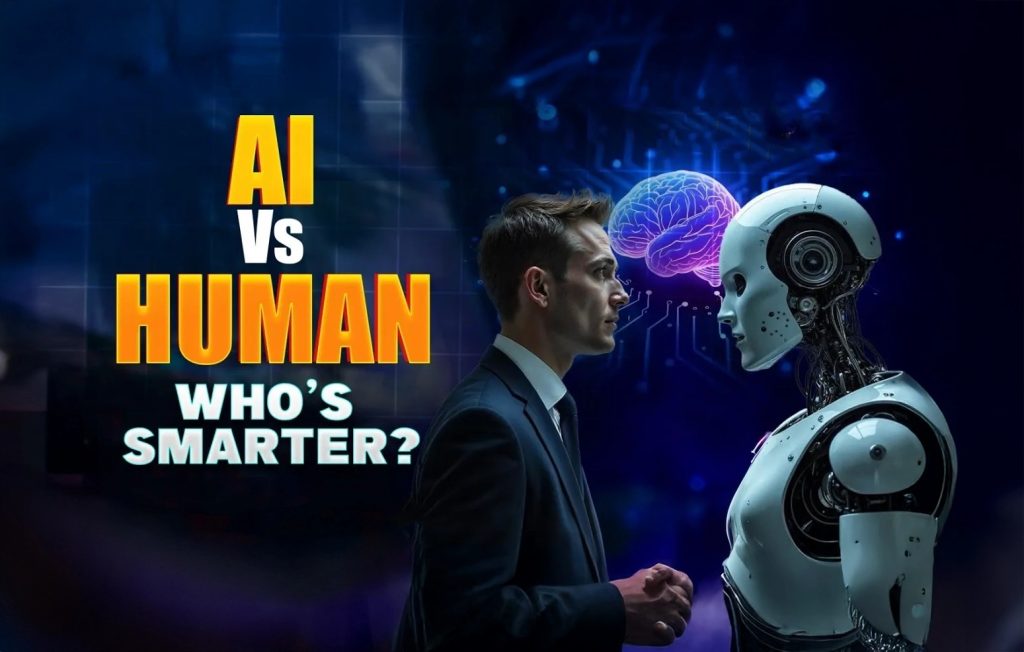AI vs Humans: Who’s Smarter? The Ultimate Showdown
The age-old question has found a futuristic battleground: Are humans still the smartest beings on the planet—or is Artificial Intelligence taking over the title? In this thought-provoking challenge, we put both to the test. It’s not just about speed or facts. We’re exploring four key arenas where intelligence is measured: knowledge, creativity, problem-solving, and emotional intelligence.
Let’s see the debate begin.
Round 1: Knowledge Battle
The first test pits human recall against AI’s lightning-fast data retrieval.
The Setup:
A host moderates a quiz-style segment with science, history, and pop culture questions. On one side, a sleek laptop powered by an advanced AI. On the other, a team of three humans—smart, witty, and ready to prove their mettle.
Questions:
- What’s the capital of Brazil?
- AI: “Brasília.” (Instant)
- Humans: Slight pause… “Brasília.”
- What is the square root of 49?
- AI: “7.”
- Humans: “Uh… 7!”
After several questions, the results are surprisingly close. Humans may take a second longer, but their answers are spot-on. The AI wins on speed, but humans keep up on accuracy.
Round 2: Creativity Showdown
Can algorithms really compete with human imagination?
Challenge 1: Write a short poem about pizza.
- AI responds in seconds with a well-structured poem.
- Humans craft a quirky, heartfelt verse that brings laughter to the room.
Challenge 2: Design a superhero.
- AI offers a sleek but predictable character.
- Humans brainstorm a superhero with an unexpected backstory and emotional depth.
The verdict? AI can imitate creativity, but humans infuse it with soul. As experts suggest, AI lacks intentionality and subjective experience, both key components of creativity (Boden 2004).
Round 3: Problem-Solving Power
This round measures logic, collaboration, and critical thinking.
Puzzle:
A farmer has a rectangular field of 120m x 80m. He wants to create a path of uniform width around it such that the remaining area is half. What’s the width of the path?
- AI instantly calculates the width: 36.98 meters.
- Humans debate, sketch, test different approaches… and finally arrive at the same answer.
Insight:
AI wins on speed again. But the human method is built on teamwork, iteration, and resilience. These qualities, while inefficient in time, are essential for navigating complex real-world scenarios.
Round 4: Emotional Intelligence
Now we test empathy and interpersonal insight—skills that go beyond logic.
Scenario:
Two team members are in conflict. How do you resolve it while keeping the team productive?
- AI’s response: “Stay neutral, identify the root cause, actively listen, and collaborate on a solution.”
- Human response: “I’d talk to both, understand how each feels, and work together toward a solution that respects everyone.”
Both answers sound reasonable. But while AI mimics emotional understanding, humans genuinely feel it. As psychology professor Lisa Feldman Barrett argues, emotions are deeply contextual and biologically grounded—an area where machines still fall short (Barrett 2017).
What Can You Do? Join the Fight
Final Verdict: It’s Not a Battle. It’s a Partnership.
With dramatic music playing and scores tallied, the result is clear:
AI excels at speed, logic, and data.
Humans shine in empathy, imagination, and adaptability.
The winner? Both.

Rather than competitors, AI and humans are collaborators—a team greater than the sum of its parts.
Collaboration Over Competition
So, who’s smarter—humans or AI? The real answer lies in synergy. Imagine a world where AI handles the heavy data lifting, while humans focus on what makes us truly unique: intuition, emotion, and creativity. Together, we are unstoppable.
Your thoughts? Share in the comments: Are you Team AI, Team Human, or Team Both?
For further assistance, visit our channel and refer the video

References
- Barrett, Lisa Feldman. How Emotions Are Made: The Secret Life of the Brain. Mariner Books, 2017.
- Boden, Margaret A. The Creative Mind: Myths and Mechanisms. Routledge, 2004.
- Russell, Stuart J., and Peter Norvig. Artificial Intelligence: A Modern Approach. 4th ed., Pearson, 2020.
- Tegmark, Max. Life 3.0: Being Human in the Age of Artificial Intelligence. Knopf, 2017.
Share This :

